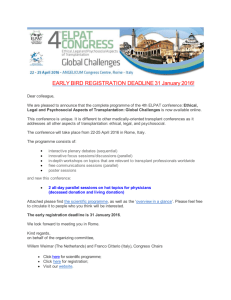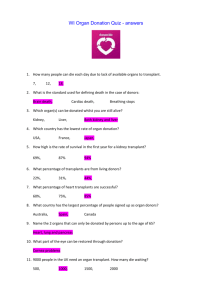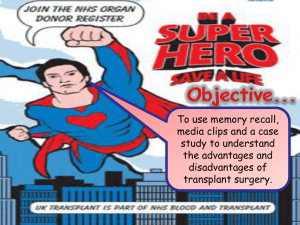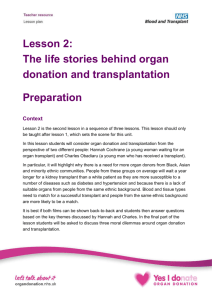QUality in Organ Donation
advertisement
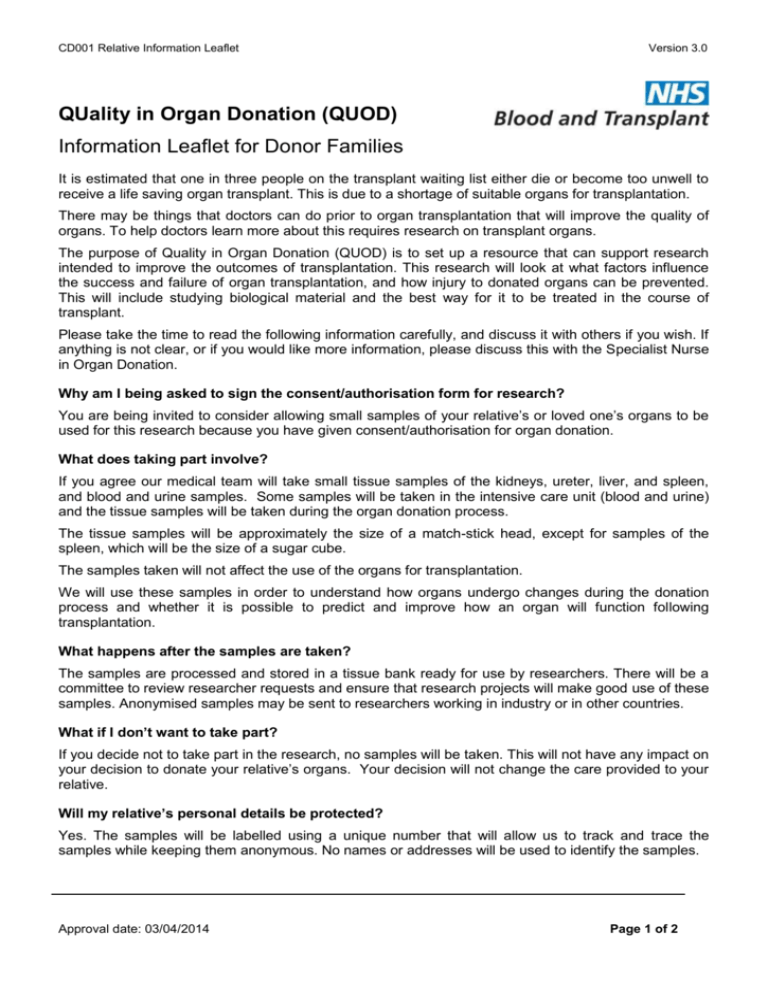
CD001 Relative Information Leaflet Version 3.0 QUality in Organ Donation (QUOD) Information Leaflet for Donor Families It is estimated that one in three people on the transplant waiting list either die or become too unwell to receive a life saving organ transplant. This is due to a shortage of suitable organs for transplantation. There may be things that doctors can do prior to organ transplantation that will improve the quality of organs. To help doctors learn more about this requires research on transplant organs. The purpose of Quality in Organ Donation (QUOD) is to set up a resource that can support research intended to improve the outcomes of transplantation. This research will look at what factors influence the success and failure of organ transplantation, and how injury to donated organs can be prevented. This will include studying biological material and the best way for it to be treated in the course of transplant. Please take the time to read the following information carefully, and discuss it with others if you wish. If anything is not clear, or if you would like more information, please discuss this with the Specialist Nurse in Organ Donation. Why am I being asked to sign the consent/authorisation form for research? You are being invited to consider allowing small samples of your relative’s or loved one’s organs to be used for this research because you have given consent/authorisation for organ donation. What does taking part involve? If you agree our medical team will take small tissue samples of the kidneys, ureter, liver, and spleen, and blood and urine samples. Some samples will be taken in the intensive care unit (blood and urine) and the tissue samples will be taken during the organ donation process. The tissue samples will be approximately the size of a match-stick head, except for samples of the spleen, which will be the size of a sugar cube. The samples taken will not affect the use of the organs for transplantation. We will use these samples in order to understand how organs undergo changes during the donation process and whether it is possible to predict and improve how an organ will function following transplantation. What happens after the samples are taken? The samples are processed and stored in a tissue bank ready for use by researchers. There will be a committee to review researcher requests and ensure that research projects will make good use of these samples. Anonymised samples may be sent to researchers working in industry or in other countries. What if I don’t want to take part? If you decide not to take part in the research, no samples will be taken. This will not have any impact on your decision to donate your relative’s organs. Your decision will not change the care provided to your relative. Will my relative’s personal details be protected? Yes. The samples will be labelled using a unique number that will allow us to track and trace the samples while keeping them anonymous. No names or addresses will be used to identify the samples. Approval date: 03/04/2014 Page 1 of 2 CD001 Relative Information Leaflet Version 3.0 What if I change my mind at a later date? If you change your mind, please contact your Specialist Nurse in Organ Donation to let them know. We will then no longer use any data recorded and will destroy the samples. However, samples and data which have already been used up to that point cannot be withdrawn. How can I find out about the results of the research project? More information about QUOD is available at www.quod.org.uk Results of the research projects using the samples we collect will also be published there. If you do not have access to the internet, if you would like to receive further information or provide feedback on your personal experience of the QUOD programme, please contact your Specialist Nurse in Organ Donation. Who is funding and organising the study? The study is being funded by NHS Blood and Transplant and is a collaboration with the following institutions: Institution: University of Cambridge University of Edinburgh Kings College London Newcastle University University of Oxford (Lead) Royal Free London University Hospital of Wales University Hospitals Birmingham Lead investigator: Prof Christopher Watson Ms Lorna Marson Mr Wayel Jassem Prof John Dark Prof Rutger Ploeg/ Ms Isabel Quiroga Mr Neal Banga Mr Elijah Ablorsu Mr. Hynek Mergental Who has reviewed the study? The study has been reviewed by the Research Ethics Committee (ref 13/NW/0017). Thank you for taking the time to consider taking part in the QUOD initiative. Principal Investigator: Professor Rutger J Ploeg Professor of Transplant Biology Honorary Consultant Transplant Surgeon University of Oxford Oxford Transplant Centre Churchill Hospital Headington Oxford OX3 7LE Email: contact@quod.org.uk Approval date: 03/04/2014 Page 2 of 2
